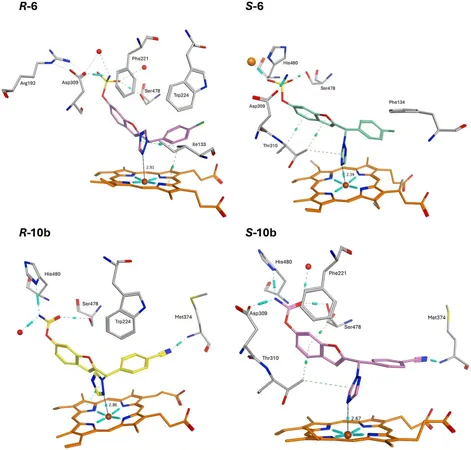
Revolutionary New Guidelines Demand Uniform Cystic Fibrosis Screening To Save Lives!
2025-04-02
Author: Rajesh
Groundbreaking Move for Newborn Screening
In a groundbreaking move, health officials are urging all U.S. states to adopt updated and standardized screening protocols for cystic fibrosis (CF) in newborns. Published in the International Journal of Neonatal Screening, these guidelines, co-authored by leading pediatric experts Dr. Meghan McGarry of UW Medicine and Dr. Karen Siklosi Raraig from Johns Hopkins University, aim to ensure that more infants are diagnosed in the crucial early weeks of life—when timely interventions can make a dramatic difference in health outcomes.
Current Inequities in Screening Practices
Currently, the landscape of newborn screening varies significantly across states, with some wielding outdated protocols that fail to capture cases of cystic fibrosis, particularly among newborns of Black, Hispanic, Asian, American Indian, and multiracial descent. “A delayed diagnosis by just a week can lead to severe weight loss and other complications,” warns Dr. McGarry. If a case is overlooked, affected children may face severe growth issues and irreversible lung damage as they develop.
Understanding Cystic Fibrosis
Cystic fibrosis, an inherited disorder affecting approximately 40,000 individuals in the U.S., is caused by mutations of the cystic fibrosis transmembrane conductance regulator (CFTR) gene, which is vital for managing salt and water flow in cells. The mutations lead to thick, sticky mucus that clogs airways and facilitates chronic lung infections, among other serious health problems.
Variability in Diagnostic Practices
While all U.S. newborns are screened for cystic fibrosis using a heel prick blood sample that measures immunoreactive trypsinogen (IRT), there’s alarming inconsistency in the diagnostic practices across states. Despite testing for IRT, variations in what constitutes an abnormal result mean some cases slip through the cracks—especially those involving rare mutations prevalent among certain ethnic groups. Some states test for as few as one CFTR mutation, leaving countless affected infants undiagnosed.
New Guidelines for Improved Outcomes
The Cystic Fibrosis Foundation's new guidelines push for several critical changes: First, uniform protocols across all states are essential for equitable health outcomes. Additionally, laboratories conducting IRT screenings should operate twice a week to eliminate diagnostic delays. The guidelines further mandate that IRT tests take into account external factors, such as temperature and humidity, which can skew results. Most importantly, labs should expand their DNA tests to screen for all known mutations related to cystic fibrosis.
The Importance of Vigilance in Diagnosis
Dr. McGarry emphasizes the importance of vigilance: “A positive test result does not guarantee a diagnosis, nor does a negative one exclude cystic fibrosis. Pediatricians must keep this in mind, especially when a baby shows symptoms consistent with the disease.” Furthermore, while a definitive diagnosis can be achieved through a sweat test measuring chloride levels, the guidelines advocate for proactive approaches to ensure screening benefits all families equally.
Impact on Life Expectancy
With life expectancy improving for cystic fibrosis patients thanks to early diagnosis and treatment options, the push for reform could truly mean the difference between life and death for many infants. The clarion call from health professionals is clear: "All babies deserve early diagnosis and timely treatment!"
Call to Action for States
The recent guidelines are a pivotal step in addressing the inequities within cystic fibrosis screening practices. The clock is ticking, and families nationwide are waiting for rapid implementation. Will your state join the movement to revolutionize newborn screening? Stay tuned!



 Brasil (PT)
Brasil (PT)
 Canada (EN)
Canada (EN)
 Chile (ES)
Chile (ES)
 Česko (CS)
Česko (CS)
 대한민국 (KO)
대한민국 (KO)
 España (ES)
España (ES)
 France (FR)
France (FR)
 Hong Kong (EN)
Hong Kong (EN)
 Italia (IT)
Italia (IT)
 日本 (JA)
日本 (JA)
 Magyarország (HU)
Magyarország (HU)
 Norge (NO)
Norge (NO)
 Polska (PL)
Polska (PL)
 Schweiz (DE)
Schweiz (DE)
 Singapore (EN)
Singapore (EN)
 Sverige (SV)
Sverige (SV)
 Suomi (FI)
Suomi (FI)
 Türkiye (TR)
Türkiye (TR)
 الإمارات العربية المتحدة (AR)
الإمارات العربية المتحدة (AR)